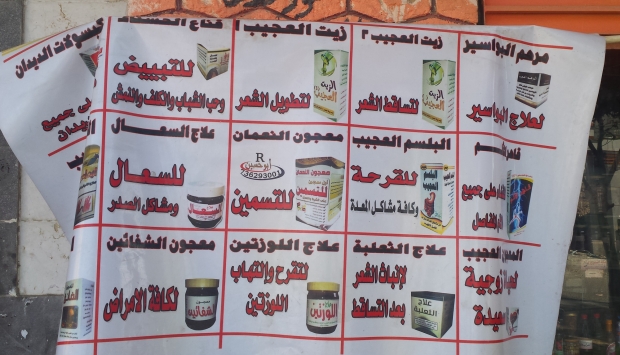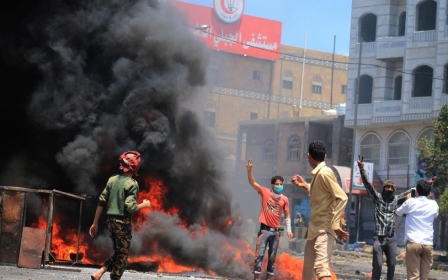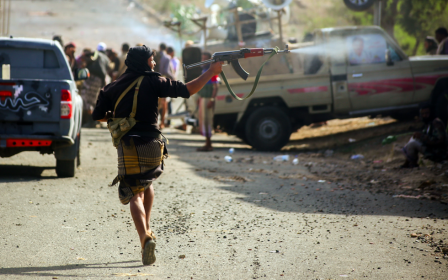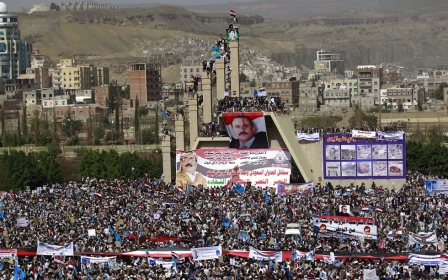Bombed-out Yemenis turn to herbal remedies as war grinds on
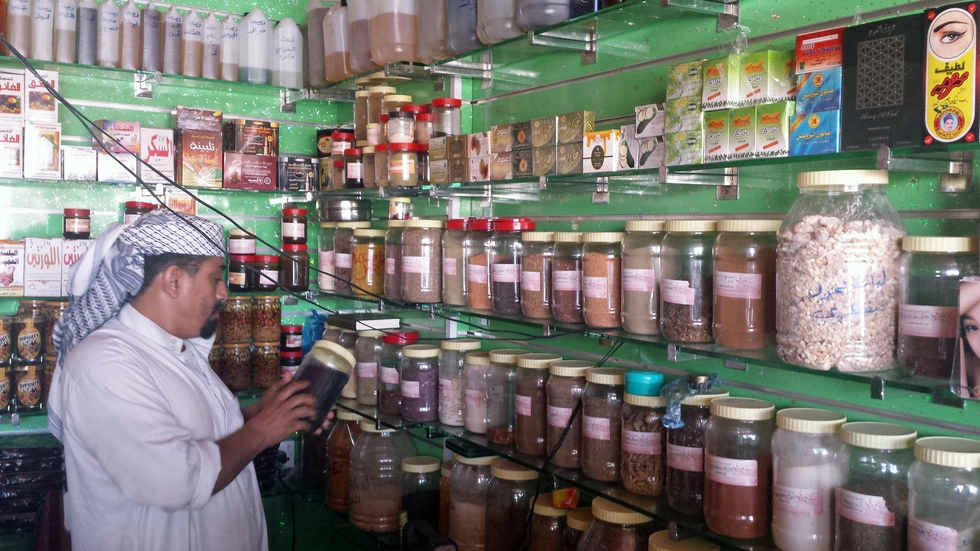
TAIZ, Yemen - Fahd al-Soroori gathers handfuls of myrrh and frankincense and mixes them with black cumin in his mortar, grinding them into a fine power as pungent aromas drift through his shop in Taiz.
This preparation will be sold to diabetics. Other remedies on the shelves, mixes of garlic, rosemary, root saps and spices, are intended for treating Alzheimer's, high blood pressure and arthritis.
On a board outside, more fanciful concoctions are advertised, including an "extraordinary oil for lengthening hair" and "a peculiar paste for a happy marriage".
"I cannot say that the herbal medicine is the best solution for all diseases, but they are good for some, such as stomach ulcers," Soroori told Middle East Eye. "They are not the best solution to others, such as diabetes, but they are cheap alternatives for the patients."
Such concoctions, unproven in their effectiveness, are all many residents of Taiz have.
"There is lack medicine in Taiz, and 80 percent of hospitals have been closed," said Soroori. "And the people do not have much money, so I kept my shop open to help those in dire need."
Yemen is blockaded from the sea and air by the Saudi-led coalition as it fights for President Abd Rabbuh Mansour Hadi against the Houthi movement and allies of former president Ali Abdullah Salah.
The result in Taiz, which has endured months of fierce fighting, is a city ground to a halt - a breakdown in law and order, hospitals destroyed, medical supplies cut, and tens of thousands fleeing.
Those who are left are often the weakest, and in desperate need.
Alawi Mohammed Thabet, 63, depended on his sons Alaa and Emad to provide him with insulin for his diabetes. They lost their jobs as electricians when the war came, and soaring insulin prices have forced him to use herbal medicine.
"I used to get the medicine for free from any state hospital, but 10 years ago they stopped providing it, and so I had to buy instead. It used to cost me 3,000 rials [$14] a month, but during the last year the price increased to more than 8,000 rials [$37]," Thabet told MEE.
Soroori's treatment, in comparison, costs $2 a month.
"The herbal medicine is not as good, but I believe it is better than death," said Thabet.
Shareefa Bint Ahmed, 56, of al-Aqaba in Taiz city, resorted to herbalists like Soroori after the cost for her medicine for high blood pressure more than doubled to 10,000 riyals ($47), and then supplies dried up.
She told MEE: "My medicine is not available in Taiz, and it is rare in [the capital, Sanaa], and I do not have sons to help me to buy it, so I resorted to going to a herbalist.
"I started to eat garlic to balance the blood pressure, but one of my relatives told me about a mixture of plants that costs only 700 riyals [$3] a month, so I used that."
She said she had no other solution, but she believed the mixture was working.
Herbal medicine has been used for thousands of years in Yemen, but its popularity waned as medical science advanced and hospitals spread across the country. During the past 10 years, however, the industry has grown.
Many shops have been closed in Taiz because of war, but business is booming for herbalists.
Soroori has worked in his shop since 2002, and in August of last year opened a new branch as desperate residents turned to alternative treatments.
He only has a secondary school certificate, and he learnt how to prepare the herbal medicines from his cousin, who runs a shop in Aden.
"I know how to prepare the medicine for dozens of diseases, including the endemic diseases, and during the war the demand for medicine increased to more than double, so I opened my new shop in al-Aqaba," he said.
Soroori grinds and pulps his mixtures in his laboratory, and greets customers to dispense advice on treatments - olive leaves and garlic are good for high blood pressure, he said, while stomach ulcers can be relieved with a mixture of shell ginger, lady's mantle and seeds from the horsetail plant. Rosemary, he said, may help Alzheimer's disease.
He knows that his mixtures are not panaceas.
Akram Ameen, a renal specialist in al-Kuwait hospital in Sanaa, said herbal medicines may help but many have not been proven.
Adnan al-Maqtari, a general practitioner at al-Thawra hospital in Taiz city, said some herbal medicines can alleviate certain symptoms, but they also carried the danger of side effects.
"The herbal medicines can help to treat a disease sometimes, but they can have side effects, so patients have to visit the doctor to ask about the herbal medicine that they will use, to avoid any bad consequences," he told MEE.
Desperate shortages
In Sanaa, importers and pharmacists say the Saudi blockade has left the country short of desperately needed medical supplies. There is no sign that things will return to normal any time soon.
A source in the Health Ministry told MEE that local factories used to produce 15 percent of medicines required for the local market, but the war has cut production by two thirds.
Sohaib al-Homaid, the owner of al-Baraka company for medicines in Sanaa, told MEE: "The coalition has changed this process of importing - everything has to go to Saudi Arabia first for inspection. This means we pay more for the medicines to arrive in Yemen, and sometimes the medicines take months to get to Sanaa.
"In addition, we face the instability of the US dollar against the riyal. Sometimes its price rises to 300 riyals on the black market, so the price of medicines has increased."
The official exchange is 215 riyals to the dollar. Yemen's central bank does not have the reserves to provide traders with dollars, and so they resort to the black market.
Homaid denied a monopoly was held by the traders of medicines, attributing the increase of prices to the difficulty of importing and the instability of the dollar.
Abdul Hameed al-Otomi, a pharmacist in Hayati, Sanaa, said there was a dire need for supplies in the capital.
"We are trying to find alternatives for some medicines, but usually we cannot find them easily, as some of the local factories of medicines have been closed, so some patients try to use the herbal medicines," Otomi told MEE.
Middle East Eye propose une couverture et une analyse indépendantes et incomparables du Moyen-Orient, de l’Afrique du Nord et d’autres régions du monde. Pour en savoir plus sur la reprise de ce contenu et les frais qui s’appliquent, veuillez remplir ce formulaire [en anglais]. Pour en savoir plus sur MEE, cliquez ici [en anglais].


